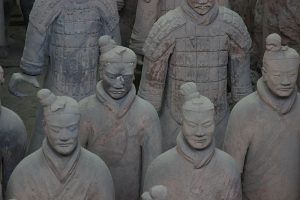As bilateral ties between China and the United States continue to deteriorate amid accusations ranging from the theft of intellectual property to increasing tensions in the South China Sea, it is interesting to examine an often used statement by Chinese. In July China’s ambassador to the U.S., Cui Tiankai, was interviewed by CNN’s Fareed Zakaria and began his interview by stating, “Actually, the Chinese civilization has been there for about 5,000 years, much longer than the United States.”
Foreigners, and especially Americans, who have been long-term residents of China, are very familiar with this comparison. On one level it is designed to show the cultural accomplishments of Chinese history. On another level it is a naked attempt to put America in what Chinese believe is its proper historical place. Professor Peter Hays Gries has argued this is a form of manipulation that is designed to show China as the superior elder or teacher and the United States as a child or student and it is a common metaphor in Chinese depictions of the U.S.
The problem with what is sometimes referred to as “the 5,000 history speech” is not that it is a blatant attempt at one-upmanship, but that it is a false comparison, which does not hold up to close examination.
The most basic problem in the narrative is that those who advocate it are confusing “Chinese civilization” with the modern nation-state of the People’s Republic of China (PRC). The comparison with “American civilization” and the modern nation-state of the United States is thus deeply flawed. The central defect of this comparison is that China wants to equate the geographic space of the present Chinese nation-state with Chinese civilization. It refuses to acknowledge that the United States as a “civilization” like most civilizations (including China’s) is not easily structured around a easily geographically identified territory.
The comparison assumes that American “culture” or “civilization” begins in 1776 with the Declaration of Independence and the founding of the United States, and before this period there was emptiness. Such a narrow perspective on history fails to account for the fact that America’s origins are heavily centered on various “European civilizations,” as well as the multiple cultures of the indigenous population of North America and Africans who were forcibly brought to the Americas as slaves. Chinese are happy to frequently cite the greatness of former Chinese dynasties such as the Tang as central to their civilization and identity, but they fail to recognize the profound influence that ancient Greece, ancient Rome, or the Enlightenment have had on the United States and its political and social institutions in similar ways.
A better comparison would be to discuss or compare “Western civilization” with “East Asian civilization.” Culture and civilization are concepts that certainly influence nation-states and their societies, but they are not held in place by a geographic strait jacket. Chinese civilization is the product of thousands of years of dynamics, ranging from interactions along the Silk Road to the invasion of China by groups such as the Mongols and Manchus. While these groups may have adopted many “Chinese” characteristics and assimilated in various ways, they still left an impact on Chinese identity and civilization. (The same can be said of immigrants to the United States, including those from East Asia.) Chinese advocates who ignore this demonstrate their ignorance of both China itself as well as the thousands of years of history that American society is derived from.
A chief challenge with this approach of specifying what one means by “civilization” or “culture” is that doing so difficult and does not easily fit into popular nationalistic narratives. Once one starts to define what is meant by the “Chinese” or for that matter “American” civilizations (or values) they will likely find themselves in a conceptual rabbit hole. Are Chinese immigrants to the U.S. devoid of Chinese cultural influences that can be traced back thousands of years? Do immigrants in the United States lose all cultural affinity with their country of birth?
Importantly, by limiting the comparison to the foundation of the United States as a nation-state, China is actually setting itself up for embarrassment. The People’s Republic of China as a nation-state did not exist until 1949 and as a concept “中国” — loosely defined as “Central or Middle Kingdom” — was never used in classical Chinese literature to express a concept of Chinese civilization or the Chinese nation. In fact, according to University of Denver Professor Zhao Suisheng, one of the world’s leading authorities on Chinese nationalism, the term “中国人” or “Chinese person,” is traced back to the turn of the 20th century, where it was advocated by nationalist writer Zhang Taiyan.
Contemporary Chinese are the product of one of the world’s great civilizations, with a rich history that Chinese are rightfully proud of and should celebrate. However, the comparison with the United States that is frequently put forth simply does not hold up to scrutiny. In the common Chinese narrative, China fuses the modern nation-state of the PRC with Chinese civilization, but it denies the U.S. the ability to do the same with Western civilization. Those who advocate such comparisons demonstrate their lack of understanding of both comparative social science and of the complex histories of the both the United States and China.
Dr. Christopher K. Colley is a non-resident China fellow at the Wilson Center in Washington, D.C.

































